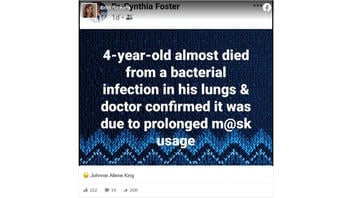
Do masks cause bacterial lung infections in children? No, that's not true: There's no evidence that masks lead to bacterial infection in children or adults, according to the U.S. Centers for Disease Control and Prevention (CDC) and medical experts consulted by Lead Stories. The CDC recommends that children ages 2 and up wear masks to help slow the spread of COVID-19.
The claim was made in a Facebook post (archived here) published on January 18, 2021. It appeared to be a copy of another post published by "Dr-Cynthia Foster." The post read:
4-year-old almost died from a bacterial infection in his lungs & doctor confirmed it was due to prolonged m@sk usage
This is what the post looked like on Facebook at the time of writing:
(Source: Facebook screenshot taken on Tue Jan 26 16:27:46 2021 UTC)
The post did not provide sufficient detail to be able to confirm the case. Lead Stories reached out to Dr. Cynthia Foster via her website, to ask for more information. Foster describes herself on that site as a "conventionally trained medical doctor who left medicine almost 20 years ago to practice 100% holistically." We will update this story, as appropriate, if we receive a response.
In the meantime, we looked into the question of whether masks cause bacterial lung infections in children. They do not.
Dr. Sean O'Leary, vice chair of the American Academy of Pediatrics (AAP) Committee on Infectious Diseases, wrote to Lead Stories:
There is zero evidence that masks can cause bacterial lung infections, and very little biologic plausibility. Our noses and throats contain billions of bacteria, so the additional bacteria that could grow in a mask are a drop in the bucket compared to that. This is absolutely misinformation, even if a doctor is claiming that this is what happened in an individual case. That is simply misguided speculation. Occasionally children will develop bacterial pneumonia, with or without a mask. In fact, we are seeing dramatic decreases in non-COVID lower respiratory tract infections, probably in large part due to the wearing of masks.
Similarly, Dr. Theresa Guilbert, a lung specialist at the Cincinnati Children's Hospital & Medical Center, told Lead Stories that no "medically creditable cases have been published in the literature." Although, theoretically, someone could get an infection from wearing a filthy face mask that was already contaminated and moldy, Guilbert's concerns lie elsewhere. She said about the post:
The harm of spreading theoretical, incorrect information like this is to lead people to take risks with their health by not wearing masks in the setting of a serious, real threat of COVID infection.
Lastly, the CDC has said that masks do not lead to bacterial infection.
#Mask use does not cause bacterial infection. Wash your mask daily in the laundry. Use laundry detergent and the warmest suitable water setting. Dry your mask using the highest heat setting or air dry in direct sunlight. More tips: https://t.co/duj5ntAcDV. pic.twitter.com/ZnpUuViMwP
-- CDC (@CDCgov) December 29, 2020
Note that the agency does stress the importance of mask hygiene. Cloths masks should be washed regularly and stored properly. Disposable masks should be thrown out.
Both the CDC and the AAP recommend that children ages 2 and up wear face coverings to help slow the spread of COVID-19, which has so far claimed the lives of close to half a million people in the United States and more than 2 million worldwide.


















